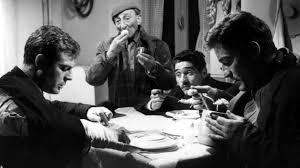 Mario Monicelli's Big Deal on Madonna Street (1958) beautifully synthesizes several disparate genres: broad farce, gritty neo-realism, the high-toned heist movie. An excellent ensemble cast sells the movie, which manages to be ridiculous, tense and moving all at once.
Mario Monicelli's Big Deal on Madonna Street (1958) beautifully synthesizes several disparate genres: broad farce, gritty neo-realism, the high-toned heist movie. An excellent ensemble cast sells the movie, which manages to be ridiculous, tense and moving all at once.Peppe (Vittorio Gassman), a failed boxer and small-time hood, agrees to take the fall for crime boss Cosimo (Memmo Carotenuto) in exchange for a healthy sum of money. Peppe learns that Cosimo is planning a major jewelry heist, which comes in handy when he's paroled. Peppe assembles an odd crew of crooks - Mario (Renato Salvatori), a pretty boy yearning to go straight; harried father Tiberio (Marcello Mastrioanni); the aged Cappanelle (Carlo Pisacane); Michele (Tiberio Murgia), a hard-boiled Sicilian; and safe cracker Dante (Toto) - carry out Cosimo's robbery. Thanks to assorted distractions, their foolproof plan starts unravel before it properly begins.
Big Deal on Madonna Street is a unique confection: it seems to send-up slick thrillers like Rififi and The Killing, but most strongly resembles The Ladykillers. Scenarists Age-Scarpelli mix genre tropes with their own broad satire. The hoods seem instantly ridiculous: they botch a video stakeout with misplaced clotheslines and inserts of Tiberio's baby; Capanelle alerts suspicious cops with a purloined alarm clock; Mario flirts with Michele's sister (Claudia Cardinale). For all their insistence on working "scientifically," they're overgrown kids with ideas too big for their brains. Dante, the only professional, has so little faith that he splits just before the heist.
While Madonna often employs pratfalls and regional humor (Michele is a walking stereotype), it offers more understatement than expected from an Italian comedy. The best gag has Cosimo holding up a store owner; he nonchalantly grabs the crook's Beretta and examines it, disarming Cosimo in more ways than one. Then there's the robbery itself, a succession of beautifully-timed gags; the criminals freeze on top of a roof, listening to an angry couple argue beneath them; they accidentally drill into a waterline; and bamboozle a watchman with a hastily-thrown cat. Finally resigned to failure, they tuck into some bean soup and wonder what the hell they're doing.
For Madonna's born of the same impulses that animated De Sica, Rossellini and other postwar filmmakers: economic destitution and displacement. The criminals' amateurishness provides humor and pathos, at once; Peppe fails as a boxer and stumbles into crime by accident; Tiberio breaks his arm, limiting his ability to take part; Capanelle is an old man mocked by everyone. Peppe courts a well-born girl (Carla Gravina) forced to work as a maid, while Mario seeks honest employment before things go too late. The final mixes both strands, with Peppe and Capanelle hiding from police among a queue of workers; Peppe's swept into a factory while Capanelle's cast out.
Monicelli works wonders with his cast. Vittorio Gassman plays Peppe straight enough to earn sympathy while still having fun. Marcello Mastroianni, the biggest star onhand, offers a subdued character turn, allowing Tiberio Murgia and Carlo Pisacane to steal scenes through scenery chewing. Renato Salvatori, resembling James Dean in short hair and leather jacket, is far removed from the fascist villains he'd play in Z andBurn! Claudia Cardinale, in her second role, already makes a striking presence.
Like Monicelli's The Organizer, Big Deal on Madonna Street finds humor in dreariness without making light of it. While not freighted with that film's ideological baggage, Madonna takes its heroes seriously enough that we sympathize even as they screw up. A more tragic, relatable band of clowns is hard to come by.

